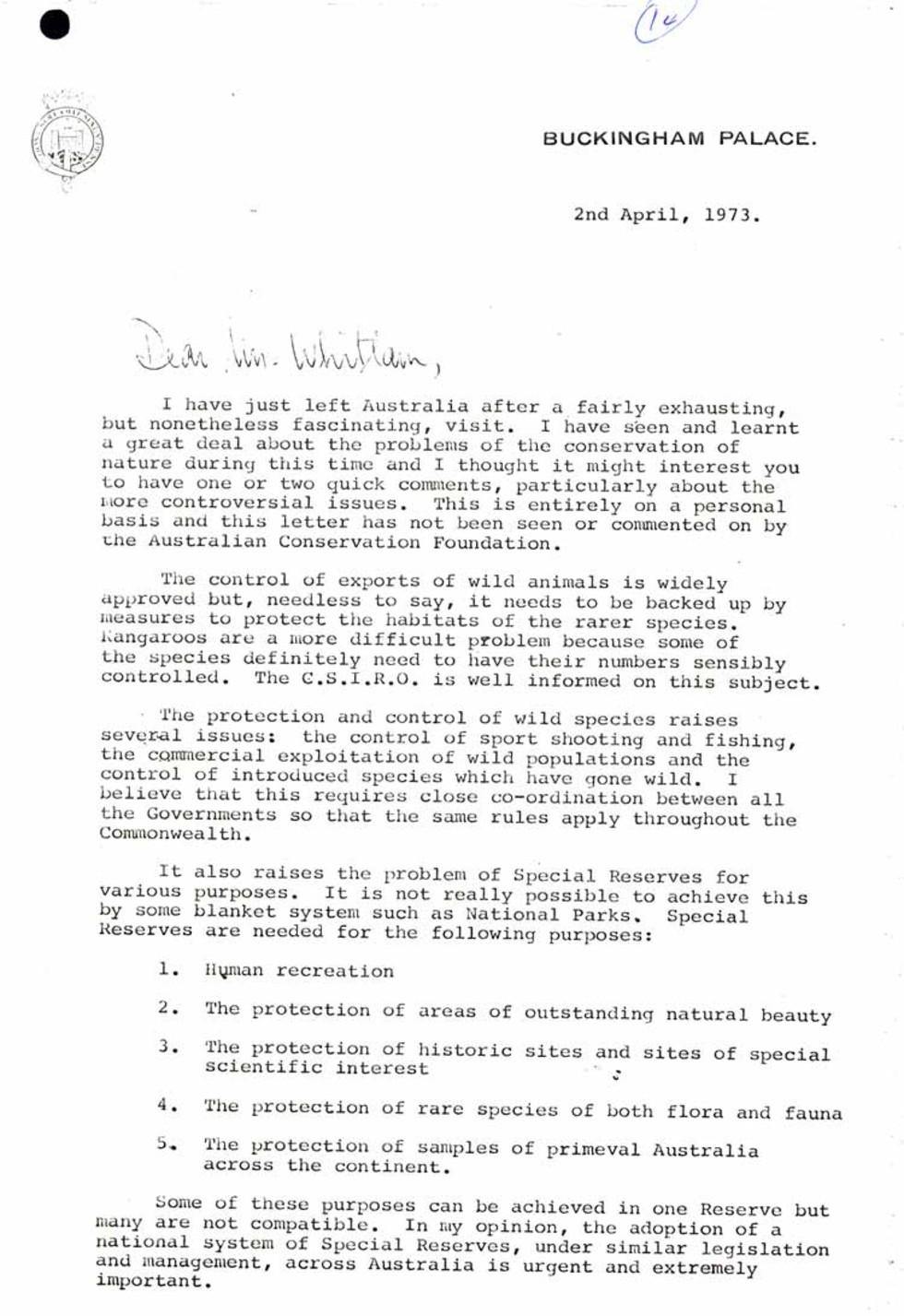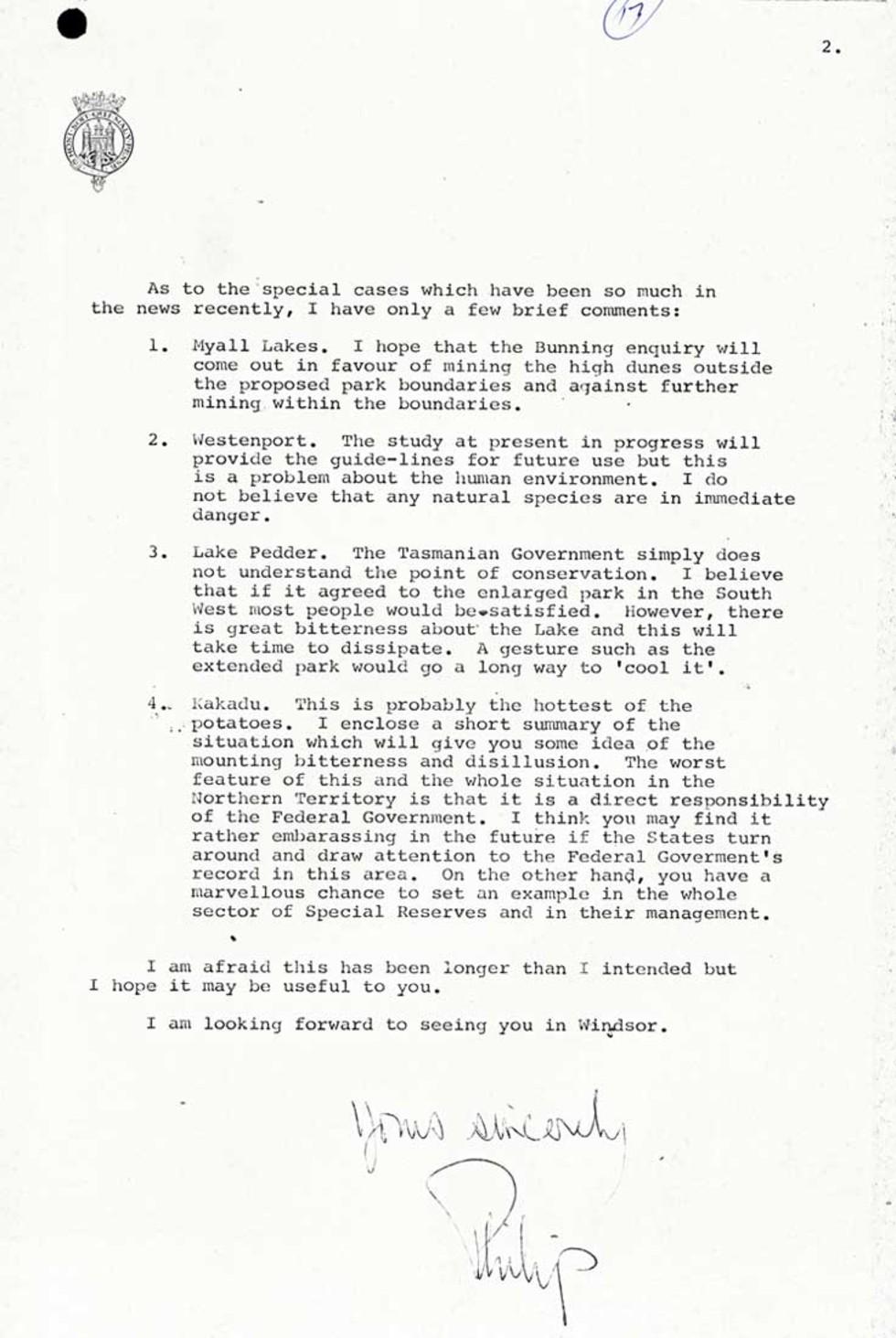

Aboriginal and Torres Strait Islander people should be aware that the National Archives' website and collection contain the names, images and voices of people who have died.
Some records include terms and views that are not appropriate today. They reflect the period in which they were created and are not the views of the National Archives.



[Page 1]
[The heraldic badge of the Duke of Edinburgh is printed in the top left corner.]
BUCKINGHAM PALACE.
2nd April, 1973.
[Handwritten] Dear Mr. Whitlam, [end handwritten]
I have just left Australia after a fairly exhausting, but nonetheless fascinating, visit. I have seen and learnt a great deal about the problems of the conservation of nature during this time and I thought it might interest you to have one or two quick comments, particularly about the more controversial issues. This is entirely on a personal basis and this letter has not been seen or commented on by the Australian Conservation Foundation.
The control of exports of wild animals is widely approved but, needless to say, it needs to be backed up by measures to protect the habitats of the rarer species. Kangaroos are a more difficult problem because some of the species definitely need to have their numbers sensibly controlled. The C.S.I.R.O. is well informed on this subject.
The protection and control of wild species raises several issues: the control of sport shooting and fishing, the commercial exploitation of wild populations and the control of introduced species which have gone wild. I believe that this requires close co-ordination between all the Governments so that the same rules apply throughout the Commonwealth.
It also raises the problem of Special Reserves for various purposes. It is not really possible to achieve this by some blanket system such as National Parks. Special Reserves are needed for the following purposes:
1. Human recreation
2. The protection of areas of outstanding natural beauty
3. The protection of historic sites and sites of special scientific interest
4. The protection of rare species of both flora and fauna
5. The protection of samples of primeval Australia across the continent.
Some of these purposes can be achieved in one Reserve but many are not compatible. In my opinion, the adoption of a national system of Special Reserves, under similar legislation and management, across Australia is urgent and extremely important.
[Page] 2.
[The heraldic badge of the Duke of Edinburgh is printed in the top left corner.]
2.
As to the special cases which have been so much in the news recently, I have only a few comments:
1. Myall Lakes. I hope that the Bunning enquiry will come out in favour of mining the high dunes outside the proposed park boundaries against further mining within the boundaries.
2. Westenport. The study at present in progress will provide the guide-lines [sic] for future use but this is a problem about the human environment. I do not believe that any natural species are in immediate danger.
3. Lake Pedder. The Tasmanian Government simply does not understand the point of conservation. I believe that if it agreed to the enlarged park in the South West most people would be satisfied. However, there is great bitterness about the Lake and this will take time to dissipate. A gesture such as the extended park would go a long way to ‘cool it’.
4. Kakadu. This is probably the hottest of the potatoes. I enclose a short summary of the situation which will give you some idea of the mounting bitterness and disillusion. The worst feature of this and the whole situation in the Northern Territory is that it is a direct responsibility of the Federal Government. I think you may find it rather embarassing [sic] in the future if the States turn around and draw attention to the Federal Government’s record in this area. On the other hand, you have a marvellous chance to set an example in the whole sector of Special Reserves and in their management.
I am afraid this has been longer than I intended but I hope it may be useful to you.
I am looking forward to seeing you in Windsor.
[Handwritten:] Yours sincerely,
[Handwritten signature:] Philip
Learn how to interpret primary sources, use our collection and more.
